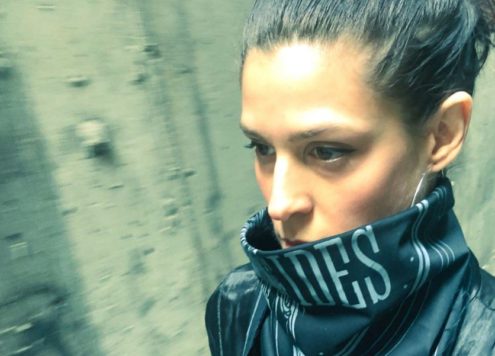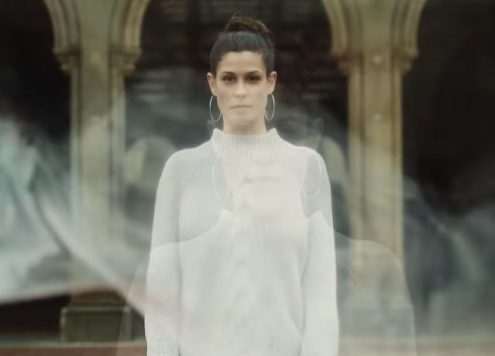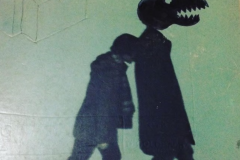To say Moor Mother is ‘different’ would be an understatement. While the music created by Camae Ayewa, who’s been recording under the moniker for the past few years, has been accepted by most in underground Hip-Hop circles, it’s unfair to simply categorize anything she does under one genre, one banner, because the brilliance that is her creations defy any finite descriptions. As part of the Black Quantum Futurism, the collective wants to take a different direction, “a new approach to living and experiencing reality by way of the manipulation of space-time in order to see into possible futures, and/or collapse space-time into a desired future in order to bring about that future’s reality.” This is taken from the book Theory & Practice (Vol. 1). It’s understandable, the road Ayewa takes is the one less traveled.
For Analog Fluids of Sonic Black Holes (Don Giovanni), Moor Mother breathes life into art through her words and music. The Philadelphia artist uses music to deliver the power of her words as they cut through thick fogs that blind those that see the world through rose-colored glasses, avoiding truth. No, her slave narratives, her truth, bringing forth the Afrofuturism she’s partly responsible for, touches souls. At least mine. It’s not an easy task to dissect the musical anomalies of Analog Fluids, opening with the noisiness of “Repeater,” as instruments caterwaul through speakers with sinister motions while Moor Mother’s words have no good wishes for those that attempt to stifle her own growth. “Don’t Die” quickly follows, rattles and shakes as Moor uses her voice as a separate instrument altogether over the cacophony of dissonance.
This is the point she takes the controlled textures of sound on “After Images,” throws in a consistent beat with a thumping bassline, and spits venom with the understanding that her own truth will be silenced at some point, along with anyone who shows dissent. Just as I’ve done, you’ll keep going back to this one because the fiery delivery will not be denied. But it doesn’t end there obviously, as she volleys words alongside her own contemporary, poet/musician Saul Williams on “Black Flight.” Over a frantic beat, both “emcees” rhyme their tales of suffrage to find refuge in any way possible. And on “The Myth Hold Weight,” she uses music as the vehicle for her story of the black experience of gentrification, pain, suffering, and urban life. Her delivery is hypnotic, and her words strike a chord at every point of inflection.
Philadelphia’s Reef The Lost Cauze (Army Of The Pharoahs) gets down with Moor Mother to duet on the poisonous “Private Silence.” Here both rhyme with disdain of parasitical individuals, a world in disarray, and being black in America. Musically, this is life! It’s haunting, it’s real, it’s everything that we should expect from music drawn from passion.
With Analog Fluids of Sonic Black Holes, I’m left wondering how Moor Mother is able to fit so much on one release. Even the closing “Passing of Time” draws on negro spirituals filled with tribal drums as Moor waxes poetic. At this very moment, it’s about Moor Mother and nothing else.
Facebook | Twitter | Instagram
With a solo career that’s going on its 15th year, I’m sure Dessa has given any detractors who thought there wasn’t any new territory to mine pause after the release of her new Sound The Bells (Doomtree) with the Minnesota Orchestra. This release takes from her previous albums and completely reimagining her songs to fit the aesthetic of orchestral movements.
The album opens with five songs off 2018’s Chime, an album that took a more delicate approach. Don’t get me wrong, there were some serious bangers on it that have made their way onto Sound The Bells, but the album has a sweetness she’d been leading to for some time. Maybe I’m looking into this a bit deeper than I should, but Dessa’s albums seemed to have led us to this very moment, and setting her song arrangements for an orchestra, it could have been her lengthy plan all along.
While listening to the opening “Jumprope” I’ve gone back and listened to the original. Orchestrated, it’s even more delicate than the original, no doubt in part to the strings and soft percussion added. It’s difficult to believe it was all recorded live because of well-controlled recording levels. It’s the same with “Good Grief,” with masterful drumming & percussion, and the backing vocals throughout it allow a lushness I haven’t heard in some time. It doesn’t get any better than that. I could say this is the album at its peak but that would make me a half-assed liar. “Velodrome” is one song I keep going back to just for the strings alone, and while the original version of “5 Out Of 6” opens with strong electronic sounds and beats before its dynamic shift, the orchestrated evolution of it morphs into strings and light percussion. And on that dynamic shift, it isn’t as dramatic but just as powerful. The arrangement does leave room for that drama a bit further along.
“Dixon’s Girl” is one track that’s been used and altered a couple of times and dates back to the 2010 full-length debut A Badly Broken Code. It remains a crowd favorite and rightly so. Whether she’s performing it tracked, with a small ensemble, and now with the orchestra, it’s pretty badass every time. Strings are again plucked with wind instruments assisting, with a low-end theory that oozes sensuality. Yes, a crowd favorite and one of mine as well. This track leads directly to her stand-alone single “Grade School Games” where we find the song fully realized. The original did incorporate strings within it which is a great Segway to the newly translated version. Strings fill out walls where guitars wouldn’t be, horns blare to glorious effect and vocally Dessa, Aby Wolf, etc. leave me emotionally drained! It’s the same with “Call Of Your Ghost,” which adds so much more depth vocally and having this one rendered differently, well, that’s just an added bonus.
Everything on Sound The Bells isn’t just about softening edges though as Dessa includes in-your-face anthems like “Fire Drills,” “Fighting Fish,” and “Skeleton Key.” The orchestra pushes the songs hard and allows the dynamics to strike heavily when and where they need to be (Note: For some reason I imagine gown-clad Dessa jumping up and down throwing up Doomtree hand signs.)
It doesn’t end there though, there’s much more that’s just as engaging. “Warsaw” confounds as much as it intrigues. The song opens and when the horns enter I’m confused as to what song this is BUT those same horns are juxtaposed against the song’s original melody, converting it into something so grandiose. It doesn’t leave me any room to even imagine where it’s going. The song has a mind of its own and as many times as I’ve listened to it, I find something new. It’s simply beautiful.
This album for Dessa isn’t surprising at all. Dessa isn’t what anyone would suggest being a one-trick pony because she can rap and sing, as well as work within other mediums. So Sound The Bells should be the culmination of everything she’s worked for. Now though, I’m left intrigued to see where she’s going from this point on. She’s set that bar so high…
Facebook | Twitter | Instagram
I have a fascination for a few things and musically speaking, I’ve found Ganser intriguing since listening to the band’s 2018 full-length debut Odd Talk. The band is playful and mixes its subgenre influences of punk/goth/new wave/no wave/post-punk, with dramatic effect. There’s certainly a good amount of work being made to enable the quartet of Nadia Garafalo (keys, vocals), Brian Cundiff (drums), Charlie Landsman (guitar), and Alicia Gaines (bass, vocals), to stand apart from their contemporaries.
The band just dropped its latest release in the You Must Be New Here EP (No Trend Records) and while it may only be four songs, it gives a clear idea as to what Ganser can accomplish in brevity. One thing about the group is its ability to literally time travel, usurping Doc’s Flux Capacitor, taking elements of other decades and making them the band’s own. “Buio” takes a much more new wave approach while “Act Natural,” a punk-endowed number, takes a no wave road. There isn’t any doubt in distinguishing it’s Ganser on both tracks. Landsman’s guitars are becoming more and more distinguishable as is the vocal interplay between Gaines and Garafalo.
We’re then led to “You Must Be New Here” where everything falls right into place. This is the moment all of the band’s influences mesh together to create the perfect storm. The melody, the instrumentation, the delivery; it doesn’t get any better than this. Garafalo’s keyboard plays sweet notes in the background while Landsman is all over the place with his guitar allowing the dissonance & feedback to seep through the track under and above his own notes and chords, while Cundiff and Gaines steadily hold the rhythm tightly together. Everyone has their place here and it’s nothing short of amazing. This doesn’t mean “Motivational Speaking” should take a backseat to it. It’s repetitive without being repetitious, as bass & guitars hypnotize.
I didn’t expect to spend so much time with this EP but Ganser forced my hand and I welcome You Must Be New Here until the band releases its next opus.
Facebook | Twitter | Instagram
At no point in time have I ever considered myself a gaming aficionado, a gamer, or having any knowledge about gaming at all for that matter. I do have some Play Station game console in a box tucked away in a closet and the only game I have with that is Wu-Tang Shaolin Style. I’m not even sure if my television(s) would allow the console to connect considering it’s probably at least 15 years old. But this is about Mike Haze, a known gamer, who’s dipped his feet into music a few years ago with a few singles and an EP and now delivers a lengthier release.
Haze draws on a number of emotions for his Opaque, which reels back and forth through dark imagery throughout while emceeing over abrasive and harsh beats that work in his favor. Musically “Masochist” urges forward with a beat that’s accentuated with an electronic bassline, surrounded by a cacophonic backdrop. But it’s the eerie “Never Afraid” that’ll leave listeners petrified and living in fear. The piano, background noise, and mechanized beat are blended to create a soundtrack to horror and when Haze raps “Never afraid of them,” I’m not sure if it’s something he’s attempting to convince himself of. But it’s the closing sample of a frantic person, the fear in his voice that’s sure to creep the fuck out of anyone.
Mike Haze’s quick-tongued lyricism is predominantly showcased throughout Opaque and on “Blood On My Wrists” it’s within the mix as well. Here though, curtains are drawn, eyes need to adjust to the shadows that don’t exist, and it’s the perfect setting for a duet with Sadistik…which it is. Both volley vocals against one another. That was my thought before reading the liner notes to see he was on the track! It’s wickedly disturbing. Haze keeps the momentum going from track to track keeping consistency within the timbre of Opaque as the quick jaunt through “Fallacy” stirs within darkness. It may last just over 2-minutes, but it lacks nothing. We then have to turn out attention to “Worthless,” which featured Ceschi & P.O.S. The three emcees take the 2-and-a-half-minute song and turn it into a classic. But seriously, I was all in at the 10-second mark, before anyone says a word. When Ceschi raps “Snake eating a snake, eating a snake, that’s the American way,” gives you a clear idea where this song’s direction is heading, over an unrestrained fuzzy beat.
With Opaque, Mike Haze has shown that, while it’s not an easy task to accomplish, being able to find success in more than one industry is a possibility. It’s not for everyone but it’s definitely for Haze, and we welcome it.












Social Media